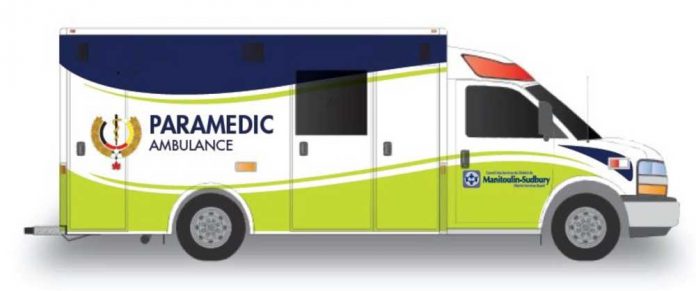M’CHIGEENG––Matt Corbiere might be Manitoulin’s first professional strongman. “I’m the only one I know of, at least from M’Chigeeng, to compete,” he said. He is a member of ACAFA/CAASA (Alliance Canadienne des Athlètes de Force Amateur), Canada’s sanctioned strongman body.
The mission of CAASA is to offer all strength athletes a Canadian structure to guide them towards organized competitions and help their development. Strongman (and strongwoman) competition and training is expanding as a sport of interest on an international level.
“It is difficult but it’s not out of anybody’s grasp,” said Mr. Corbiere. “It is a very difficult sport and I think it’s probably one of the more dangerous ones. In strongman you’re usually lifting heavier weights either for maximum repetitions or maximum amount of weight or you’re lifting or carrying a heavy object for a distance for weight or time or a combination.”
It is no easy feat to do what he’s done, in the short time span since he began training. The events are difficult, using oversized, awkward implements and heavy weights. Practice is difficult as implements are uncommon or custom built items and can be expensive. “For strongman, everything is kind of oversized and everything is built awkwardly,” said Mr. Corbiere. “”It makes every lift a lot harder to do. The implements would be a specialty bar such as an axle bar. That’s a two inch bar whereas a standard bar is 28 mm.”
Farmer handles are a common implement. “That’s like carrying two really heavy suitcases on either side,” he added. “Hundreds of pounds per side. The last event that I did was the Toronto Pro Show. I lifted two hundred pounds per hand and carried it for 120 feet.”
There is a yolk walk, called a super yolk. “It’s almost like carrying a squat rack on your back, but you’re not squatting. You’re carrying that rack that weighs 500 pounds for 60 feet as fast as you can.”
Mr. Corbiere’s first sanctioned competition, the Wally’s Classic, was held at Carleton Place in Ottawa. He was nervous. “The first event was called a frame carry. The frame was maybe the size of a picnic table but you stand inside and it has handles. You have to walk carrying the 400 pound frame,” Mr. Corbiere said. “I was extremely nervous for that one. I was coming off of a hand injury. I had to hold on to this frame for 100 feet going as fast as I can. There was another man next to me carrying a heavier frame. I was trying to be conservative but I didn’t want him to beat me.”
Another event was the 600 pound tire flip. You have to flip the tire as many times as you can in 75 seconds. “I had no idea how I was going to place,” he said. “I didn’t have access to a 600 pound tire to train with. All I did was watch YouTube videos and read articles. I did my best to practice in my head and when it came time, that methodology worked, just by miming out the moves.” With the larger tires technique is important. Mr. Corbiere managed seven flips while another competitor “blew out a bicep.”
Mr. Corbiere placed fourth in his second competition. “I was pretty proud that I was one of the smaller guys and I was able to get through. I was conservative in a few of the events because I didn’t want to risk injury. I’ve always been conservative in my form and my training just to make sure I’m safe because I want to keep going. When they said I was in fourth place I was really happy with that. It really isn’t about winning for me, it’s not about placing. It’s about trying to get as good as I can as safely as I can so I can look back at myself from the future and be proud of myself.”
Strongman is a dangerous sport. When someone is injured right before it’s your turn to compete that can be intimidating. Mr. Corbiere maintains his focus by blocking everything out and using visualization techniques. “I don’t look at anyone,” he said. “Everyone becomes a background noise. I just basically listen to what my body is doing with the lift. I have a picture in my mind of what I’m going to do and then I do my best to do that the way I pictured it. I know it’s going to go good when my hearing goes a little weird. You absolutely have to maintain that focus and form. You might be defeated if you get too scared and let that get into your head.”
Prior to joining the CAASA, Mr. Corbiere and partner Kim Pahpeguish both competed at a gym in Elliot Lake. “I was very nervous and didn’t do well at all,” he said. Ms. Pahpeguish did well, lifting about 265 pounds in her first competition attempt.
“The implements we use would mimic something from the turn of the century, where you would have to carry hay bales or a heavy yolk for a distance, or how they used to haul water,” said Mr. Corbiere. He talked about being able to carry a deer downhill while hunting and how strongman training has made that possible.
Ms. Pahpeguish liked how an announcer explained not only how dangerous the sport was but also related it to life in the past. “He talked about how hard our ancestors worked. There’s no reason why we can’t tap into that again, why we can’t be doing that (hard work).”
“In the competition setting I’m absolutely terrified,” said Mr. Corbiere. “I think being extremely stressed out in that situation and then following through with the event and completing that event – after being so stressed out I think that’s almost like training for real life. When stressful events happen I’m already tough enough because I’ve already been in situations to make whatever happens less stressful.”
“I’ve been in a lot more stressful situations so when stressful situations happen in my life they’re easier to deal with. It carries over, the strength training and putting yourself in stressful situations and voluntary hardship. It does a lot for a person’s mental health.”
“People don’t realize the importance that the correlation physical activity has with mental health,” added Ms. Pahpeguish. “It’s not just about physical health.” She tags her online activity with #mymentalhealthfix. “It also helps keep us on point, considering where we both came from in our lives.” They were both taking medications for depression and anxiety.
Mr. Corbiere’s fitness journey began when his father had a heart attack. “What scared me was my doctor was telling me I’m at a high risk,” he said. “I was overweight. I had a sedentary job, a stressful job, and I was an alcoholic. I did a lot of drinking. The doctor told me that so I thought I might as well try getting into better shape so I picked up kettlebells. I learned through books and a podcast, and then I added deadlift. There was another podcast and more reading. I found I was good at deadlift. As my strength started to increase I noticed I was drinking less.”
Unfortunately, he had difficulty dealing with some stressful situations while he was living out west. He was having family problems and gave up on trying to be healthy. He gave up on himself and just drank, a lot, and didn’t really know what to do. He lost his licence after being caught drinking and driving and that made it difficult to do his job as a journeyman crane operator in the oilfields out west.
“My whole identity was staked on being a crane operator who makes lots of money and once that was taken away from me, I became nothing; I became a child again. That’s a really big contrast to what I do now. I don’t have any money but I’m very healthy and I think I can handle any situation. I think back to the way I used to be and I can’t even imagine being that weak again, or materialistic.”
“He’s very humble,” said Ms. Pahpeguish. “We have very little but we have more.”
Mr. Corbiere would now rather be the guy at home who challenges himself and inspires some of his friends
“I didn’t have any direction in my life and I was in a rough spot; then I remembered I was able to lift some heavy stuff a little while ago. Then I was able to remember back in my childhood working with my dad and seeing him lift some stuff. I always respected him because he was strong. I thought, okay, I’m not doing anything, just drinking. I’m not really going anywhere. I’ve got no job. I’ll just start lifting.”
He wanted to be intelligent about it so through reading and following programs he found myself doing primarily strength training but adding unconventional twists, like pulling a heavy sled. His strength started increasing and he was able to let go of the bottle.
“As my strength went up it was a lot easier,” he explained. “I was able to feel better about myself, have a meaning in my life. I thought, I can chase this goal down and the addiction started to get easier to let go of. Drinking was the furthest thing from my mind. I was able to quit drinking recreationally. By recreationally, I mean buying more than I need and calling it fun.”
Strength training led him to compete. He was trying to live better and wanted to make sure he was doing it right. “I wanted to test to see if my methods worked. I was able to let go of antidepressants and blood pressure medications. My blood pressure is nice and low. All those meds I used to take are all gone. My only medication now is going to a gym and getting strong,” he said.
Mr. Corbiere and Ms. Pahpeguish met online through Healthy Active Natives, started talking to each other and then met at the gym in M’Chigeeng.
They work out at Mr. Corbiere’s outdoor gym now and encourage each other. “She really helps me,” said Mr. Corbiere. “I got really good at lifting because I was teaching her how to lift.”
Ms. Pahpeguish agreed. “When you are coaching someone it helps you to understand it better.”
Ms. Pahpeguish is a child and youth mentor with Atikameksheng Anishnawbek First Nation. Last year she started a youth powerlifting group and Mr. Corbiere went on Fridays to assist. “There were mainly girls and one boy,” she said. “Five at a time. We got them inspired.”
“I always hear of victim mentality with regards to First Nations and that drives me,” said Mr. Corbiere. “I want to prove we’re not victims. A person can change their situation so they can never be a victim as long as they don’t give up on themselves. If I can do it, and give up drinking, anybody can.”
Strongman is a good analogy for life, he feels. “You confront extreme difficulties under disadvantageous circumstances. You can feel really frightened by it but rise above it. I think that’s my favourite part.”





